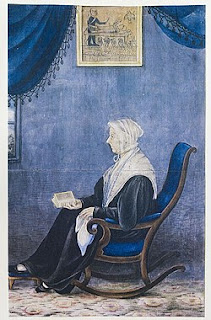 |
| Lucy Mack Smith |
For example, in the Joseph Smith Papers, Translations and Revelations, Vol. 5, Original Manuscript, the Introduction cites or refers to Lucy 36 times.* But they carefully avoid what she said about Cumorah and the Urim and Thummim.
The Saints book, Volume 1, follows the same approach, citing Lucy's history dozens of times but omitting what she said about Cumorah and the Urim and Thummim.
And yet, there is nothing inherently suspect about Lucy's recollections regarding Cumorah. When she related what Joseph said about Moroni's visit, she recalled that Moroni identified the hill where the plates were deposited as the "hill of Cumorah."
When Joseph was late returning home from Manchester in early 1827, he explained to his parents that he had encountered the angel "at the Hill Cumorah."
The intellectuals who reject (and censor) these accounts offer no justification for their choice other than their need to accommodate the Mesoamerican/two-Cumorahs theory (M2C). Instead, they resort to two patently outcome-driven rationales:
- Some say Lucy's reference to Cumorah must be attributed to her erroneous adoption of a supposedly false tradition about Cumorah started by unknown early persons at an unknown time.
- Others say Lucy wasn't credible because she didn't describe the First Vision in her original dictated account (the 1844/5 version).
Obviously, these two objections contradict one another.
While it's true that Lucy didn't mention the First Vision in her history, that is consistent with the actual history; i.e., Joseph didn't say he told anyone other than the Methodist minister about his vision (JS-H 1:21, and we don't know what he actually told the minister anyway).
Given that Joseph never told his mother contemporaneously about the First Vision, why would anyone expect Lucy to relate a memory of something that didn't happen?
In Lucy's 1845 draft, someone inserted Joseph Smith's 1838 account of the First Vision, but Lucy did not say Joseph told her about it when it happened.
IOW, Lucy's omission of the First Vision in her dictated history is evidence that her memory was intact and accurately related.
Yet the M2C scholars want us to believe that because Lucy didn't relate a false retrospective memory of the First Vision, she did relate a false retrospective memory of what Joseph said about the hill Cumorah.
If not for their obsession with accommodating M2C, no historian would propose such an analysis.
This is the type of irrational thinking that arises when people become apologists for a theory instead of unbiased historians seeking to relate accurate history.
_____
* Excerpts from the Introduction below. In addition, the Introduction cites Lucy's history 23 times.
- Joseph Smith's mother, Lucy Mack Smith, recorded that her son acquired the plates in the early morning of 22 September 1827
- Lucy Mack Smith, who remembered seeing the spectacles before her son's move to Harmony, gave a description of the instrument that is similar to Harris's
- Lucy Mack Smith, who was still living in Manchester when the loss occurred, recalled in her 1845 history that her son returned to Harmony almost immediately after learning the manuscript had been lost:
- Lucy Mack Smith did not learn that her son had received the plates again until she and her husband, Joseph Smith Sr., visited Harmony in early September 1828.
- Lucy Mack Smith recorded that it was with delight that her son stated he had “commenced translating,” with Emma's assistance.
- Lucy Mack Smith recorded that when the angel returned the plates to Smith, he also promised “that the Lord would send [him) a scribe.”
- Given the antagonism of their neighbors, Lucy Mack Smith and her husband were reluctant to share their son's experiences with their new acquaintance.
- According to Lucy Mack Smith's reminiscence, Cowdery eventually gained the trust of the Smiths.
- Cowdery told Lucy Mack Smith and her husband, “There is a work for me to do in this thing and I am determined if there is to attend to it.”
- Lucy Mack Smith stated later that “evil designing people were seeking to take away Joseph's life in order to prevent the work of God from going forth among the world.”
- When Lucy Mack Smith received word that the translation was complete, she, her husband, and Martin Harris traveled to the Whitmer home.

No comments:
Post a Comment